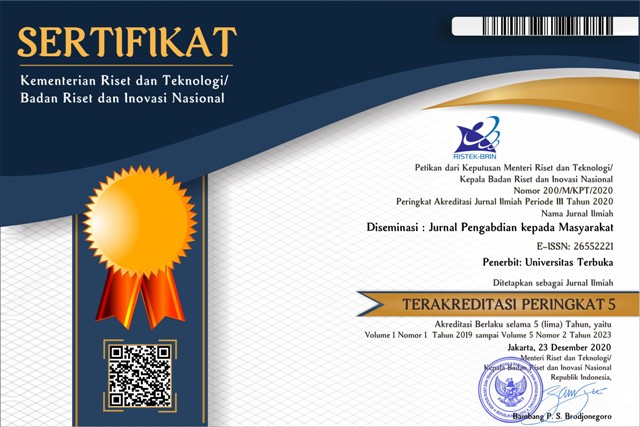PENDAMPINGAN LITERASI MELALUI DISEMINASI KEGIATAN PENGEMBANGAN MEDIA PEMBELAJARAN
DOI:
https://doi.org/10.33830/diseminasiabdimas.v6i1.6454Keywords:
Literasi, Diseminasi, Media, PembelajaranAbstract
SD Negeri 9 Mamboro adalah sekolah dasar yang berada di wilayah provinsi Sulawesi Tengah, kondisi kemampuan literasi dapat bervariasi secara signifikan tergantung pada berbagai faktor salah satunya adalah dukungan kemampuan guru dalam pengembangan profesional guru dalam hal literasi dan memberikan sumber daya yang diperlukan. Tujuan kegiatan PkM adalah untuk meningkatkan kemampuan literasi masyarakat, khususnya mereka yang berada di tingkat pendidikan dasar atau sekolah dasar. Hasil pendampingan kegiatan literasi diperoleh peningkatan kemampuan literasi siswa secara signifikan. Hasil pengamatan terhadap kegiatan proses belajar mengajar di kelas diperoleh data >50% siswa telah mampu menerapkan pembiasaan dan motivasi membaca, keterampilan menulis, keterampilan berbicara, keterampilan mendengarkan, berpikir kritis.
SD Negeri 9 Mamboro is an elementary school located in the province of Central Sulawesi, the condition of students' literacy skills in literacy skills can vary significantly depending on various factors, one of which is the support of teachers' abilities in the professional development of teachers in terms of literacy and providing the necessary resources. The purpose of PkM activities is to improve the literacy skills of the community, especially those at the basic education or primary school level. The results of the literacy activity assistance significantly improved students' literacy skills. The results of observations of teaching and learning process activities in the classroom obtained data >50% of students have been able to apply reading habituation and motivation, writing skills, speaking skills, listening skills, and critical thinking.
References
Annis Kandriasari, Yeni Yulianti, Sachriani, And Jarudin. 2023. “Mobile Learning American Service As Digital Literacy In Improving Students’ Analytical Skills.” Journal Of Advanced Research In Applied Sciences And Engineering Technology 31(2):184–96. Doi: 10.37934/Araset.31.2.184196.
Atenas, Javiera, Leo Havemann, And Cristian Timmermann. 2023. “Reframing Data Ethics In Research Methods Education: A Pathway To Critical Data Literacy.” International Journal Of Educational Technology In Higher Education 20(1):11. Doi: 10.1186/S41239-023-00380-Y.
Azzajjad, Muhammad Fath, Dewi Satria Ahmar, And Muh. Syahrir. 2020. “The Effect Of Animation Media In Discovery Learning Model On Students’ Representation Ability On Chemical Equilibrium Materials.” Journal Of Applied Science, Engineering, Technology, And Education 2(2):204–9. Doi: 10.35877/454RI.Asci22125.
Banihashem, Seyyed Kazem, Mohammadreza Farrokhnia, Mehdi Badali, And Omid Noroozi. 2022. “The Impacts Of Constructivist Learning Design And Learning Analytics On Students’ Engagement And Self-Regulation.” Innovations In Education And Teaching International 59(4):442–52. Doi: 10.1080/14703297.2021.1890634.
Bansal, Charu. 2021. “Digital Literacy Of School Students In India: A Study.” Learning Community: An International Journal On Educational And Social Development, 12(2). Doi: 10.30954/2231-458X.02.2021.3.
Calloway, Linda Jo, John Walker, Susanne O’Callaghan, Meral Binbasioglu, Catherine Dwyer, And Raymond Elson. 2019. “DIGITAL LITERACY: ASSESSING PERCEIVED DIFFERENCES AMONG COMPUTING STUDENTS FROM TWO NEARBY UNIVERSITIES.” Pp. 10378–10378 In. Palma, Spain.
Chiu, Thomas K. F., And Ching-Sing Chai. 2020. “Sustainable Curriculum Planning For Artificial Intelligence Education: A Self-Determination Theory Perspective.” Sustainability 12(14):5568. Doi: 10.3390/Su12145568.
Ettinger, Allyson. 2020. “What BERT Is Not: Lessons From A New Suite Of Psycholinguistic Diagnostics For Language Models.” Transactions Of The Association For Computational Linguistics 8:34–48. Doi: 10.1162/Tacl_A_00298.
González, José Antonio Canchola, And Leonardo David Glasserman Morales. 2019. “Digital Adult Literacy In Virtual Learning Environments: The Case Of Xmoocs In Energy Sustainability.” Pp. 987–92 In Proceedings Of The Seventh International Conference On Technological Ecosystems For Enhancing Multiculturality. León Spain: ACM.
Hartono, Hartono, Chandra Lesmana, Ryan Permana, And Matsun Matsun. 2018. “Pelatihan Dan Pendampingan Pembuatan Media Pembelajaran Berbasis Multimedia Interaktif.” Transformasi: Jurnal Pengabdian Masyarakat 14(2):139–47. Doi: 10.20414/Transformasi.V14i2.587.
Huysken, Kristin, Harold Olivey, Kevin Mcelmurry, Ming Gao, And Peter Avis. 2019. “Assessing Collaborative, Project-Based Learning Models In Introductory Science Courses.” Journal Of The Scholarship Of Teaching And Learning 19(1). Doi: 10.14434/Josotl.V19i1.26777.
Lazonder, Ard W., Amber Walraven, Hannie Gijlers, And Noortje Janssen. 2020. “Longitudinal Assessment Of Digital Literacy In Children: Findings From A Large Dutch Single-School Study.” Computers & Education 143:103681. Doi: 10.1016/J.Compedu.2019.103681.
Liu, Zhi-Jiang, Natalia Tretyakova, Vladimir Fedorov, And Marina Kharakhordina. 2020. “Digital Literacy And Digital Didactics As The Basis For New Learning Models Development.” International Journal Of Emerging Technologies In Learning (IJET) 15(14):4. Doi: 10.3991/Ijet.V15i14.14669.
Siiman, Leo, And Mario Mäeots. 2019. “ASSESSING STUDENTS’ DIGITAL LITERACY WITH INTERACTIVE COMPUTER-BASED TASKS CREATED IN GOOGLE APPS SCRIPT.” Pp. 10265–71 In. Palma, Spain.
Twiningsih, Anik, And Evi Elisanti. 2021. “Development Of STEAM Media To Improve Critical Thinking Skills And Science Literacy.” International Journal Of Emerging Issues In Early Childhood Education 3(1):25–34. Doi: 10.31098/Ijeiece.V3i1.520.
Downloads
Published
Issue
Section
License
Copyright and Licensing

Diseminasi : Jurnal Pengabdian kepada Masyarakat is licensed under a Creative Commons Attribution-NonCommercial-NoDerivativeWorks 4.0 International License. Allows users to copy and distribute the Article, provided this is not done for commercial purposes and further does not permit distribution of the Article if it is changed or edited in any way, and provided the user gives appropriate credit (with a link to the formal publication through the relevant DOI), provides a link to the license, and that the licensor is not represented as endorsing the use made of the work.















